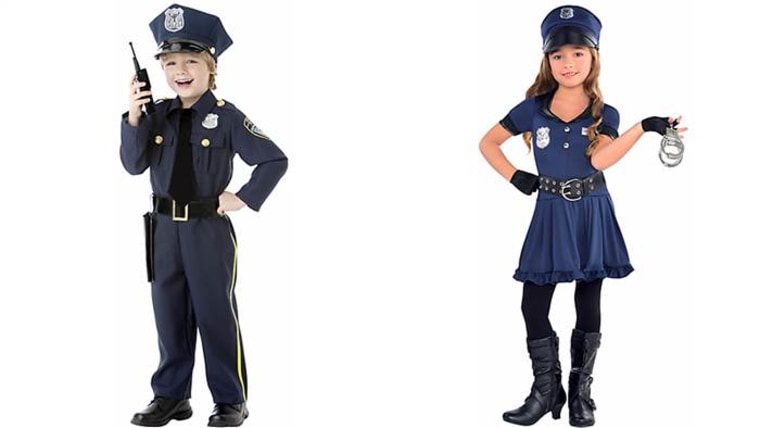A version of this post originally ran on Parent Toolkit.
Lin Kramer’s 3-year-old daughter came home from preschool one day with a story to share.
Daughter: “Mommy, a boy in my class told me that I can’t be Superman.”
Kramer: “Why can’t you be Superman?”
Daughter: “Because I’m a girl. He said I can’t be Superman, I can be a supermodel.”
Little did her daughter know, but this encounter happened shortly after Kramer wrote an open letter to Party City on the company’s Facebook page expressing her concern about the retailer’s Halloween costume options for young girls.

“When you look around at the police officers in your city or neighborhood, the uniforms they wear are probably substantially similar to the costumes you have elected to offer for boys,” Kramer said in her Facebook post. “However, the same cannot be said of the costume you market to girls. Generally speaking, real life uniformed female police officers do not wear short skirts and low cut shirts, but instead wear exactly the same slacks and shirts as their male counterparts.”
Gender stereotypes are perpetuated early and often, even in seemingly innocent Halloween costume aisles. Whether it involves sexualizing young girls’ costumes or strictly defining what boys should wear and what girls should wear, experts agree that this early labeling can be limiting.
Parent Toolkit expert and psychologist Dr. Michele Borba said that by dictating what children should be, we may be stifling what they could be.
“There are so many other qualities than gender,” Borba said. “The bottom line is we want to raise happy, healthy, strong kids. If we stereotype in gender, race, age, we really start to pigeon-hole them and it begins to set up bias that there are certain things they can’t be.”
Borba said a great way for parents to support their children in instances when gender stereotypes seem prevalent is to practice “check that.”
“For example, young girls may say they can only grow up to be a nurse,” Borba said. “As a parent, check that. Check the bias. Ask your child to think about women they know. ‘What about aunt Sally? She works for NASA.’ Counter it so the child expands their view.”
Parent Toolkit expert Richard Weissbourd, a faculty member at the Harvard Graduate School of Education, said the Halloween costumes marketed to young girls can reduce their sense of possibility and self-worth.
“This is the scariest part of Halloween to me: the hyper-gendering,” Weissbourd said. “It tells girls to come to value themselves in terms of their attractiveness to men.”
Sexualized costumes for young girls are raising concern for experts and parents alike.
“It’s really important to know that it’s only increasing,” Borba said. “Every year around this time, I always get this same kind of question. Girls are becoming more and more sexualized at a younger and younger age. Once a year, we give in.”
Kramer said she isn’t giving in.
“It isn’t that I want my daughter to grow up and be a firefighter and not be a princess,” Kramer said. “I have no preconceived notions of what I want her to be or not be. I want her to thrive and be happy and to feel personally fulfilled in whatever way is most appropriate for her. We tell little people that they can be whatever they want to be. But those words are completely contradicted when you look at Party City’s website, and other retailers, too. The message they send to children is you can be whatever we tell you you can be.”
In a statement to NBC News, Party city explained in part that the company "supplies a broad assortment of costumes suitable for all styles, tastes, and budgets. We believe parents are as involved in their children's costume choices as they are in selecting their everyday attire ..."
Kramer isn’t the only parent wondering about the differences in costume options for boys and girls. Recently, Paul Henson posted a photo on Facebook of his son dressed in an Elsa costume.
“Anyone that knows us, knows we generally let Caiden make his own choices, to an extent,” Henson wrote. “Well he has decided on a Halloween costume. He wants to be Elsa. He also wants me to be Anna. Game on. ... Halloween is about children pretending to be their favorite characters. Just so happens, this week his is a princess.”
Parent Toolkit expert and education consultant Jennifer Miller noted expectations about gender roles affect both boys and girls.
“Sadly, there is still a fear that if a boy explores girls' toys or costumes, it may say something about his sexuality,” Miller said. “There is absolutely no correlation between kids' exploration of toys and costumes that favor the opposite gender and future sexuality. ... Our hard and fast cultural rules about gender come back to haunt us in adulthood when we are not as open to those who are different.”
Kramer said she tries to make sure she talks to her daughter when she hears or sees limiting ideas and messages.
“It’s worth taking the time instead of just accepting it,” Kramer said. “Don’t just endorse or accept those limiting attitudes and marketing practices to children. I tell her that that’s not reality. She can do anything.”
And this Halloween, anything for Kramer’s daughter is Mary Poppins.